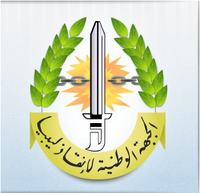National Front for the Salvation of Libya
| National Front for the Salvation of Libya | |
|---|---|

Seal of the National Front for the Salvation of Libya
|
|
| Dates of operation | 7 October 1981 – 9 May 2012 |
| Motives | The end of Muammar Gaddafi's regime and the establishment of a democratic state in Libya |
| Active region(s) |
|
| Status | Defunct; reorganized into the National Front Party |
The National Front for the Salvation of Libya (NFSL) was a political opposition group active during the rule of the Gaddafi regime in Libya. It was formed in 1981 and called for major liberalising reforms such as democratic elections, a free press, and the separation of powers. During the 1980s, it pursued a campaign of armed opposition to the Gaddafi regime and made several coup attempts, the most notable being its 1984 armed assault on Gaddafi's Bab al-Azizia compound in Tripoli. After the failure of this and several other coup attempts the group largely abandoned militancy, and instead used peaceful tactics to promote reform in Libya; in 2005, the NFSL joined with six other groups to form the National Conference for the Libyan Opposition.
With the fall of the Gaddafi regime in the 2011 Libyan Civil War, the NFSL's main long-term goal was fulfilled. Consequently, after the war's end, the NFSL dissolved itself and was replaced by the National Front Party, which won 3 seats in the 2012 General National Congress election. The NFSL's founder and former leader, Mohamed Yousef el-Magariaf was appointed Chairman of the General National Congress, effectively making him interim head of state.
Mohamed Yousef el-Magariaf, a former Libyan ambassador to India, founded the NFSL on 7 October 1981, at a press conference held in Khartoum, Sudan. The group was allowed to operate out of Sudan until 1985, when the country's leader, Gaafar Nimeiry was ousted in a coup d'état. The NFSL launched a wide campaign to topple the regime of Muammar Gaddafi in Libya, establishing a short-wave radio station, a commando military training camp and also published a bi-monthly newsletter, Al Inqadh (Salvation). According to various sources, the group was supported by the government of Saudi Arabia, and the United States' Central Intelligence Agency.
...
Wikipedia
